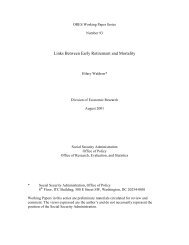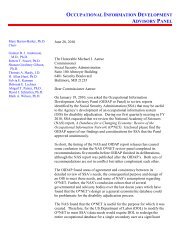6This is a very important characteristic of the earningstest provisions, and too often misunderstood or ignoredboth by researchers and experts. Benítez-Silva and Heiland(2007 and 2008) present a good discussion and analysisof this important feature. Leonesio (1990), Gustman andSteinmeier (1991), and Gruber and Orszag (2003) describethis feature, but do not study it in detail. For the most recentevidence of how widely misunderstood this feature is, werefer the reader to a recent article by Stan Hinden, whichappears in the AARP’s October 2007 Bulletin, p. 23. Mostof the other research on the earnings test has focused on thetaxation aspects; see Vroman (1985), Burtless and Moffitt(1985), Honig and Reimers (1989), Leonesio (1990), Reimersand Honig (1993 and 1996), Friedberg (1998 and 2000),Baker and Benjamin (1999), and Votruba (2003).7If none of these assumptions are correct, it could verywell be, for example, that individuals who value the futurevery little (very much) find the current penalties for earlyretirement too high (or too low). Crawford and Lilien (1981)and Gustman and Steinmeier (1991) question the actuarialfairness of the system at the individual level, even if it hassome bite at the aggregate level.8Queisser and Whitehouse (2006) review, with anapplied approach, this and other related concepts using datafrom a number of Organisation for Economic Co-operationand Development countries. Breyer and Hupfeld (2007)provide a more theoretical discussion to understand theredistributive effects of early retirement provisions.9See Gustman and Steinmeier (1985) for an early discussionof the possible consequences of the 1983 reforms.10Only recently have researchers (Benítez-Silva andHeiland 2007 and 2008) emphasized the nearly actuarialfairness of the earnings test and have connected its fairlycomplex incentives with the early benefit claiming behaviorof older Americans.11An alternative data source is the aggregate historicaldata from the Supplement, reported in Table 6.A4 of the2008 edition and in similar tables in the historical editionsof the document. In previous versions of this article, wealso used this additional source of data and compared itwith the public-use microdata we use here. The conclusionsare similar, but provide an interesting comparison betweenan analysis using aggregate data and individual-level data.The aggregate data has some weaknesses, for example,the information for retired workers and dependents is notpresented separately, and it is essentially impossible tomake any statistical argument about the differences inbenefit levels because we only have information about themean of the distribution of benefits by age, but not about thestandard deviation, preventing us from utilizing the data tomake any inference about the statistical differences.12The MBR has variables that probably allow for thisdistinction, but the public-use files do not.13This selection bias is not present in the aggregatedata using the Supplement because it reports yearly, notretrospective, data. It is natural to expect an upward bias inthe retrospective adjusted benefit levels in the microdata,and this is what we conclude from comparing that datawith the data in the Supplement. These results are availableupon request.14Notice that all our empirical analysis takes the calendaryear perspective, and not a birth cohort perspective. Themain reason is a serious right censoring problem that is dueto the time span of the data, which prevents us from followinga large number of individuals in younger cohorts intoolder ages. Despite this problem, we construct our maintables of interest by cohort, and the results do not changeappreciably. In particular, as with the by-year data, we canobserve the drop in the proportion of individuals claimingbenefits for the 1938 cohort and the decline in benefitreceipt once the members of the cohort become eligible toclaim benefits after 2000. These results are available fromthe authors upon request. Recent work by Muldoon andKopcke (2008), who take the birth cohort perspective, alsodoes not find major differences in claiming behavior.15Queisser and Whitehouse (2006) using 2002 mortalitydata find that the U.S. reduction for early retirement isnot actuarially fair (it is too low) and too generous givencurrent mortality figures, which results in a subsidy forearly retirement and a penalty for late retirement. This inpart explains the preference for early retirement expressedby Americans in the last decades, and also some of ourresults on benefit levels because higher-income individuals,likely to live longer, are the ones benefiting the most fromthis low reduction. The authors also find, based on the samemortality data, that the DRC is nearly actuarially fair.16Rust and Phelan (1997) show quite convincingly thatthe proportion of individuals claiming benefits at age 62could be explained through explicitly modeling that someindividuals are liquidity constrained. However, they wereusing data from the 1970s with a much lower claiming peakat age 62, and they restricted attention to individuals forwhom <strong>Social</strong> <strong>Security</strong> was essentially their only source ofincome in retirement.Peracchi and Welch (1994) cast some doubt over thisexplanation, unless it is possible to provide a justificationfor why the proportion of liquidity-constrained Americanswould shift so much over time. This point is especiallyimportant given the large age-62 peak we have discussed,pointing in the direction of alternative explanations for thecurrent developments in claiming behavior. Recently, thelarge current peak at age 62 has been replicated if beliefsregarding the future ability of the system to pay benefits areaccounted for (Benítez-Silva and others 2009). Althoughit is widely stated that any reforms to the system will notaffect those close to retirement age, it is also clearly statedby <strong>Social</strong> <strong>Security</strong> in their communication to future beneficiariesthat some reforms will be necessary to maintainthe sustainability of the system and that they are likely toresult in lower benefits. In a recent New York Times article,May 12 2007, Laurence J. Kotlikoff argues in favor of92 <strong>Social</strong> <strong>Security</strong> Bulletin • Vol. 69 • No. 3 • 2009
late claiming of benefits by those that hold relatively largeprivate pension assets. This is also defended by the sameresearcher along with others in a recent U.S. News andWorld Report article, February 11, 2008.17Notice (and this is true in all the tables) that a givenindividual only appears in one of the cells identified by ageand year, and that corresponds to the first time they applyfor benefits.18In principle, we cannot rule out possible period effectsresulting from at least two aspects. First, the focal point ofthe year 2000 as the arrival of the new millennium couldhave lead some individuals to postpone their retirement(claiming of benefits) until this milestone date. Second, thenew decade came with the burst of the technology bubbleand a slowdown in job growth after the robust growth of thelate 1990s; this change in trend could have prompted someindividuals consider retirement as their expectations offuture income growth became less optimistic.19See also Gustman and Steinmeier (2004), Song (2004),and French (2005) for discussions of the likely consequencesof the removal of the earnings test.20We thank an anonymous referee for making this pointto us.21To truly compare these benefit levels we have to takeinto account the adjustments to their PIA so that the dollaramounts by column and rows are in the same actuarialunits. The idea is that although a person who claims atage 62 will mechanically have a lower monthly benefit thana person who claims at age 65 yet has the same earningshistory, the early claimer receives 3 more years of benefitsand therefore is in present value at the actuarial adjustmentfactor, and assuming that they will live to the same age,their benefit levels are actuarially equivalent.22This means that if individuals were randomly assignedto claiming at a given age between say age 62 and age 70,and without the existence of any policy changes in thisperiod, the benefit levels (on average) in a given year for thedifferent ages should be identical, and the differences overtime could only be explained by time effects (macro effectsbut not related to <strong>Social</strong> <strong>Security</strong> reforms) or cohort effects.23These tables show the actual PIAs for the same groupof individuals as shown in Table 3, and therefore both setsof numbers can be directly compared. It is clear that ourapproximation is quite close to the PIA of record, and thedifferences can be traced back, as explained earlier, to thetiming of claiming we have assumed and the role of theearnings test. Notice, that the main results of our analysisare essentially unchanged.24More recently Haveman and others (2006) analyzewhether early retirees will be able to maintain their wellbeingduring retirement. Given the data they use, little isdiscussed regarding level of benefits, and they do not compareearly claimers with those that delay claiming benefits.25It is still true, however, that especially for long-livedearly retirees and their survivors and low-income earlyretirees, the reduction can have real welfare consequences,even if for the average individual they are not of first orderimportance.26The fact that the proportion of individuals claimingbenefits changed considerably in the year that the earningstest was eliminated for those above the FRA and that thecomposition of claimers in the post-2000 period seemed tohave significantly changed for those claiming after age 65 ishowever a bit puzzling in light of the discussion of Benítez-Silva and Heiland (2008), where the authors clearly showthat the real incentives of the earnings test are very closeto being actuarially fair given the adjustment of benefits atthe FRA if benefits were withheld. These large shifts suggest,as discussed by Benítez-Silva and Heiland (2007), alikely lack of knowledge about this important aspect of theearnings test provision. Those authors estimate that onlyaround 40 percent of individuals are aware of this aspectof the rules that govern the earnings test. In recent workusing telephone surveys on individuals’ knowledge of the<strong>Social</strong> <strong>Security</strong> retirement system Benítez-Silva, Demiralp,and Liu (2009) show that a majority of Americans do notseem to be aware of even some of the basic features of thesystem.27This group can also potentially include individualswho do not need the benefit yet for a variety of reasons(access to private pensions or other sources of income) andconsider the DRC a fair rate of return. Notice that additionalwork can lead to a recomputation of benefits, whichcan only be an advantage to individuals regardless of theireconomic circumstances.28Unfortunately, the public-use microdata file does notprovide any additional characteristics of individuals.ReferencesBaker, Michael, and Dwayne Benjamin. 1999. How doretirement tests affect the labour supply of older men?Journal of Public Economics 71(1): 27–51.Benítez-Silva, Hugo, and Debra S. Dwyer. 2006. Expectationformation of older married couples and the rationalexpectations hypothesis. Labour Economics 13(2):191–218.Benítez-Silva, Hugo, Debra S. Dwyer, Frank Heiland,and Warren C. Sanderson. 2009. Retirement and <strong>Social</strong><strong>Security</strong> reform expectations: A solution to the new earlyretirement puzzle. Forthcoming.Benítez-Silva, Hugo, and Frank Heiland. 2007. The <strong>Social</strong><strong>Security</strong> earnings test and work incentives. Journal ofPolicy Analysis and Management 26(3): 527–555.———. 2008. Early claiming of <strong>Social</strong> <strong>Security</strong> benefitsand labor supply behavior of older Americans. AppliedEconomics 40(23): 2969–2985.<strong>Social</strong> <strong>Security</strong> Bulletin • Vol. 69 • No. 3 • 2009 93
- Page 1 and 2:
Social SecuritySocial SecurityBulle
- Page 3:
Social SecurityBulletin Vol. 69, No
- Page 6 and 7:
Perspectives77 An Empirical Study o
- Page 8 and 9:
Selected Abbreviations—continuedM
- Page 10:
within the next few years (Aglira 2
- Page 14 and 15:
coverage varies significantly by ra
- Page 16 and 17:
non-Hispanic white, and college edu
- Page 18 and 19:
same groups (Table 6). For the last
- Page 20 and 21:
from DB to DC pensions is accelerat
- Page 22 and 23:
Table 8.Percent of individuals who
- Page 24 and 25:
not necessarily the largest gains a
- Page 26 and 27:
shoring-up DB plans before those pl
- Page 28 and 29:
Table B-1.Percent change in mean pe
- Page 30 and 31:
Table B-3.Percent of individuals wh
- Page 32 and 33:
ReferencesAaronson, Stephanie, and
- Page 35 and 36:
Social Security Administration’s
- Page 37:
Chart 1.Historical expansion of Soc
- Page 40 and 41:
self-employment information for the
- Page 42 and 43:
(Cronin 1985). The final earnings r
- Page 44 and 45:
prior to 1950, first year of earnin
- Page 46 and 47:
average indexed monthly earnings (A
- Page 48 and 49: 13For an explanation of how the sel
- Page 50 and 51: Kopczuk, Emmanuel Saez, and Jae Son
- Page 53 and 54: Occupations of SSI Recipients Who W
- Page 55 and 56: on the differences between the occu
- Page 57 and 58: prediction models. Table A-1 lists
- Page 59 and 60: Occupational Distributions of theEm
- Page 61 and 62: similar, only 4 percent of the popu
- Page 63 and 64: Table 5.Estimated occupational dist
- Page 65 and 66: Table 7.Predicted Herfindahl-Hirsch
- Page 67 and 68: Table 9.Estimated occupational dist
- Page 69 and 70: Table 11.Average annual wages of wo
- Page 71 and 72: Table A-2.Means and standard errors
- Page 73 and 74: Table A-3.Coefficients and standard
- Page 75 and 76: Table A-3.Coefficients and standard
- Page 77 and 78: Table A-3.Coefficients and standard
- Page 79 and 80: management, professional, and relat
- Page 81: Stapleton, David C., Nanette Goodma
- Page 84 and 85: Selected Abbreviations—continuedO
- Page 86 and 87: The 1983 Amendments to the Social S
- Page 88 and 89: Chart 1.Proportion of new claimants
- Page 90 and 91: Table 4.The evolution of the ARF an
- Page 92 and 93: for the test of equality of means b
- Page 94 and 95: Table 8.Average monthly Social Secu
- Page 96 and 97: in the chart, especially for men, t
- Page 100 and 101: Benítez-Silva, Hugo, Berna Demiral
- Page 103 and 104: OASDI and SSI Snapshot andSSI Month
- Page 105 and 106: Monthly Statistical Snapshot, Augus
- Page 107 and 108: Table 2.Recipients, by eligibility
- Page 109 and 110: SSI Federally Administered Payments
- Page 111 and 112: Table 7.Average monthly payment, by
- Page 113: Awards of SSI Federally Administere
- Page 116 and 117: Copyright—Authors are responsible
- Page 119 and 120: Program Highlights, 2009Old-Age, Su








